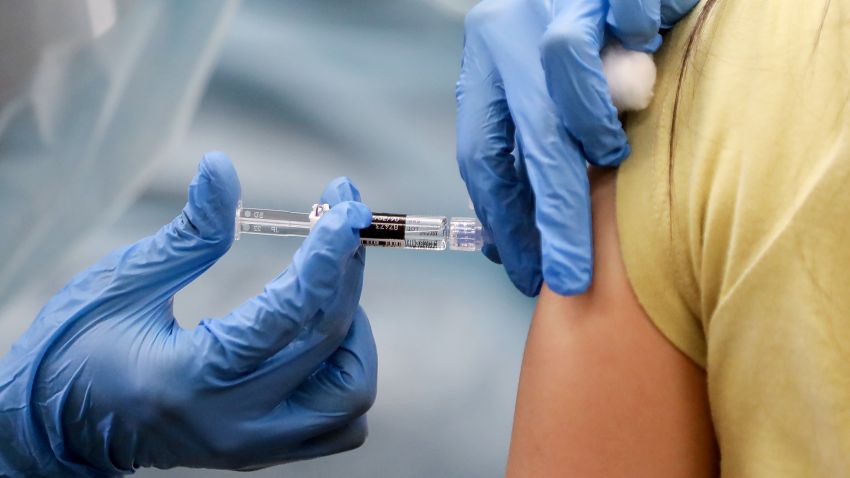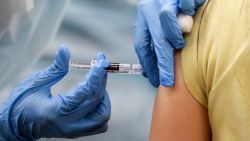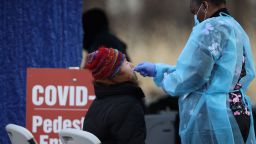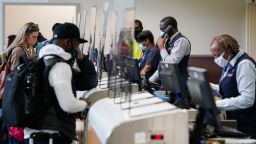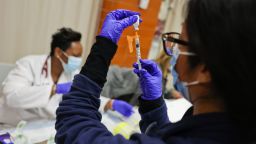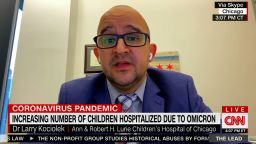The US is ringing in the new year amid a Covid-19 surge experts warn is exploding at unprecedented speed and could alter daily life for many Americans during the first month of 2022.
“Omicron is truly everywhere,” Dr. Megan Ranney, a professor of emergency medicine at Brown University’s School of Public Health, told CNN on Friday night. “What I am so worried about over the next month or so is that our economy is going to shut down, not because of policies from the federal government or from the state governments, but rather because so many of us are ill.”
The nation broke records at least four times this week for its seven-day average of new daily Covid-19 cases, reporting an all-time high of more than 386,000 new daily infections Friday, according to the latest data from Johns Hopkins University. The high case count is already causing disruptions in the country.
In New York City, the Metropolitan Transportation Authority (MTA) is plagued with staffing issues and announced three subway lines – the B, Z and W – which service various parts of the boroughs, have been suspended.
“Like everyone in New York, we’ve been affected by the COVID surge. We’re running as much train service as we can with the operators we have available,” the MTA wrote on Twitter Thursday.
New York continues to break its own record, adding 85,476 reported Covid-19 cases, according to Saturday’s briefing from New York Gov. Kathy Hochul.
Hospitalizations jumped to 8,451, up from around 8,000 in the report released Friday, according to the latest data. The state’s seven-day positivity rate is 19.79%.
The number of one day case additions has increased 219% since Monday, when the state reported an addition of 26,737 cases.
Healthcare services – exhausted after several surges of the virus and now stretched thin again by a growing number of Covid-19 patients – are also already feeling impacts. The University of Maryland Capital Region Health this week joined a growing list of medical centers in the state to activate emergency protocols after a sharp rise in cases fueled staffing shortages and overwhelmed emergency departments.
“The current demand for care is depleting our available resources, including staffing,” UM Capital Region Health said in a statement on Friday.
In Ohio, Gov. Mike DeWine on Wednesday announced the deployment of about 1,250 National Guard members as hospitals struggle with staffing shortages.
On the same day, the mayor of Cincinnati declared a state of emergency due to staffing shortages in the city’s fire department following a rise in Covid-19 infections. The mayor’s declaration said if the staffing problem goes unaddressed, it would “substantially undermine” first responders’ readiness levels.
“Get ready. We have to remember, in the next few weeks, there’s going to be an unprecedented number of social disruptions,” Dr. Peter Hotez, dean of Baylor University’s National School of Tropical Medicine, told CNN.
Those include flight disruptions as well, he said, because of TSA agent and air crew absences.
Thousands of flights have already been canceled or delayed throughout the holiday season as staff and crew called out sick. On Friday, the Federal Aviation Administration said an “increased number” of its employees were testing positive for the virus, and “to maintain safety, traffic volume at some facilities could be reduced, which might result in delays during busy periods.”
Your top questions about Covid-19, answered
Previous rules of virus are ‘out the window’
The latest surge, which has sent case numbers exploding across the globe, is fueled by the Omicron variant, the most contagious coronavirus strain yet, health experts say.
The virus is now “extraordinarily contagious” and previous mitigation measures that used to help now may not be as helpful, CNN medical analyst Dr. Jonathan Reiner told CNN on Friday.
“At the beginning of this pandemic… we all were taught, you have a significant exposure if you’re within six feet of somebody and you’re in contact with them for more than 15 minutes. All these rules are out the window,” Reiner said. “This is a hyper-contagious virus.”
Now, even a quick, transient encounter can lead to an infection, Reiner added, including if someone’s mask is loose, or a person quickly pulls their mask down, or an individual enters an elevator in which someone else has just coughed.
“This is how you can contract this virus,” Reiner said.
The variant’s transmissibility helps explain the staggering number of infections reported globally, including in the US. in the past week, several states have reported new case and hospitalization highs, shattering previous records.
New Jersey recorded more than 28,000 new Covid-19 cases through PCR testing, Gov. Phil Murphy wrote on Twitter Friday. In a news conference, the governor said the number was roughly “quadruple from just two weeks ago, and four times as many cases than during the height of last winter’s surge.”
“Our hospitals right now are at roughly the same numbers they were on the worst day of last winter’s surge,” he added. “The problem is that right now we don’t see any sign of let up.”
Other states, including Arkansas, Maryland and New York, also reported new records for case numbers.
And a sharp rise in infections – especially in children – could soon lead to a spike in hospital admissions, infectious diseases expert Dr. Jeanne Marrazzo said.
“The explosive rise in cases is really fueling what normally might be a relatively small proportion … of kids who are experiencing these severe outcomes,” she told CNN’s Amara Walker on Friday. “But you put the gigantic numbers of cases together with the small number affected, plus the proportion of unvaccinated, and I’m really worried that we’re going to be in for a tidal wave of admissions, particularly for kids in the coming weeks.”
Child Covid-19 hospital admissions already reached an all-time high this week, with a record average of 378 children admitted to hospitals on any given day over the week ending December 28, according to the US Centers for Disease Control and Prevention and the US Department of Health and Human Services.
Children younger than 5 are not yet eligible for a Covid-19 vaccine, and a shot for those groups likely won’t be available until mid-2022, experts say.
Concerns about returning to school
With the virus spreading, some staff members and experts are expressing concern about what school reopenings could mean.
“There will be pediatric hospitalizations,” Hotez said. “And what’s going to be the other tough piece in the next weeks, keeping the schools open, because of this high transmissibility – especially if you start seeing absences of school teachers, bus drivers, cafeteria staff.”
The Massachusetts Teachers Association, New England’s largest public sector union, urged the state education commissioner this week to keep schools closed on Monday, except for staff Covid-19 testing.
“Using Monday as a day for testing and analyzing data will allow our school districts to make prudent decisions around staffing needs so they can continue in-person learning for students if it is safe or develop contingency plans if a district deems it to be necessary,” Merrie Najimy, the association’s president, said in a statement.
The state’s Executive Office of Education said Friday schools will be open on Monday, despite the teacher union’s request.
“The Department of Elementary and Secondary Education worked hard this week to make at-home rapid tests available to all public school teachers and staff in light of the testing shortages being experienced around the country. Massachusetts is one of only a handful of states supplying rapid tests to its teachers. It is a not a requirement for teachers to return to work, or necessary to reopen schools after the holiday break,” Colleen Quinn, a spokesperson for the office, said in a statement.
“It is disappointing,” the statement added, “that once again the MTA is trying to find a way to close schools, which we know is to the extreme detriment of our children.”
Atlanta Public Schools (APS) announced all district schools will operate virtually through Friday, January 7, for all students and staff, according to a statement on Saturday.
Citing the surging Covid-19 cases, APS said the district elected to postpone in-person learning until Monday, January 10. The move will allow students and staff to be tested and if needed, to isolate and quarantine, per CDC and Department of Health Guidelines, according to APS.
All APS staff members are required to report to their workplaces on Monday for Covid-19 testing, the statement said.
Neighboring Fulton County Schools and DeKalb County Schools also announced Saturday they are starting online next week as students return to classes after the holiday break, according to verified tweets from both districts.
Fulton and DeKalb also aim to return to in-person instruction on January 10.
Meanwhile, a growing number of colleges and universities across the country are making changes to the beginning of the 2022 spring semester as a result of the case surge.
Duke University extended its plan for remote classes by another week because of an “incredibly high” positive case count among faculty and an increasing number of cases among students who are already in the area, the school said Friday.
Michigan State University announced Friday that classes will start primarily remotely on January 10 and will stay remote for at least three weeks.
“I realize that students prefer to be in person, and so do I,” Samuel L. Stanley Jr., the university’s president, said in a statement. “But it is important that we do so in a safe manner. Starting the semester remotely and de-densifying campus in the coming weeks can be a solution to slowing the spread of the virus.”
Correction: A previous version of this article misstated the number of records broken this week in the seven-day average of new daily Covid-19 cases. The most recent average figure has also been updated to reflect the latest data from JHU.
CNN’s Claudia Dominguez, Kiely Westhoff, Virginia Langmaid, Elizabeth Stuart, Laura Studley and Sharif Paget contributed to this report.
